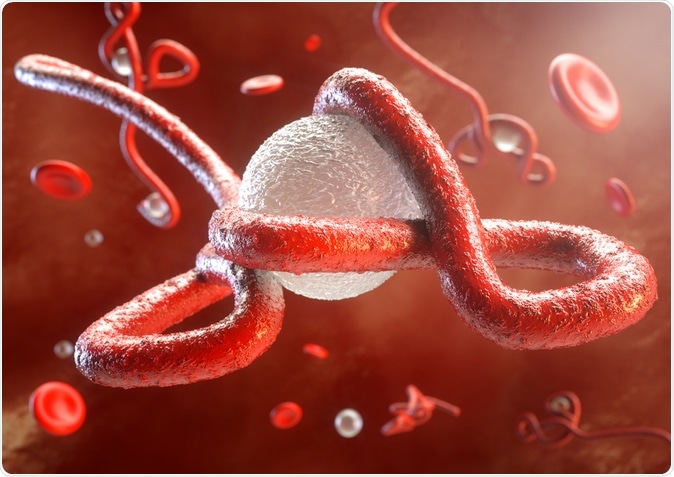Healthcare workers in Uganda have begun vaccinating high risk health workers against the deadly viral infection Ebola this week. This is the first time that a vaccination drive has begun before the actual outbreak.
This precaution is being taken because the health care officials are worried that the infection would spread into the country from the borders shared with Democratic Republic of Congo. At present the outbreak in Democratic Republic of Congo is at its worst. The fear of transmission of the infection via the borders is heightened by the armed conflicts in the region, say officials.

Ebola virus attacks the immune system illustration: Image Credit: Crevis / Shutterstock
In DRC till date, this season, around 300 cases of Ebola have been suspected with 265 confirmed cases of the disease. The World Health Organization (WHO) report says that till date the infection has killed 151 individuals in the country. In a statement the WHO states, “In vaccinating frontline health workers against Ebola virus disease even before Uganda detects a single case, health authorities are being cautious having learnt bitter lessons from previous outbreaks.”
The vaccine that is being administered is still experimental but has been shown to be protective in the clinical trials. It will be administered only to around 2000 first contact health care workers who are working near the borders of DRC in the north Kivu province says the WHO and would not be available for the general public.
“It is highly likely that Uganda may import Ebola virus disease from DRC given the closeness of the current epicenter, the high population movements due to trade, social-cultural connections and easy accessibility of health services in Uganda,” the WHO said. The individuals in DRC who have been in contact with an Ebola patient have been vaccinated and those in contact with these contacts have also been vaccinated. This is called the “ring vaccination strategy” and is an effective method of eradicating highly contagious infectious diseases, say the officials.
Yonas Tegegn Woldemariam, WHO’s Uganda representative said, “In previous [Ebola] outbreaks, Uganda lost health workers, including the renowned Dr Matthew Lukwiya, as they cared for patients. Scientists believe such invaluable lives would have been saved had a vaccine been in existence then.”
Jane Aceng, Uganda’s health minister in a statement added, “The public health risk of cross border transmission of Ebola to Uganda [from DRC] was assessed to be very high at the national level. The affected areas in the DRC [North Kivu and Ituri provinces] are about 100km from Uganda’s border districts. An undiagnosed Ebola patient could present to a health facility in Uganda for medical attention. This context puts the healthcare and frontline workers in Uganda at risk of being in contact with an [Ebola] case.”
Ebola is a deadly viral infection that was first detected and identified in 1976. Since then there have been regular outbreaks across Central and West African countries. Uganda was affected before in 2000 and 2001 where the infection killed 261 and infected 574 individuals. The infection killed 11,000 died in Sierra Leone, Liberia and Guinea and infected 28,000 in the period between 2014 and 2016.
The infection is capable of killing 20 to 70 percent of those who are infected depending on the strain of virus. Once infected only management available is supportive therapy. There are some experimental antibody based therapies that are being tried in treating the disease. Some of these combinations include ZMapp, REGN-EB3, the antiviral drug remdesivir and single-antibody drug called mAb114.
This latest vaccine to be administered has been developed by Merck and is not yet licensed.